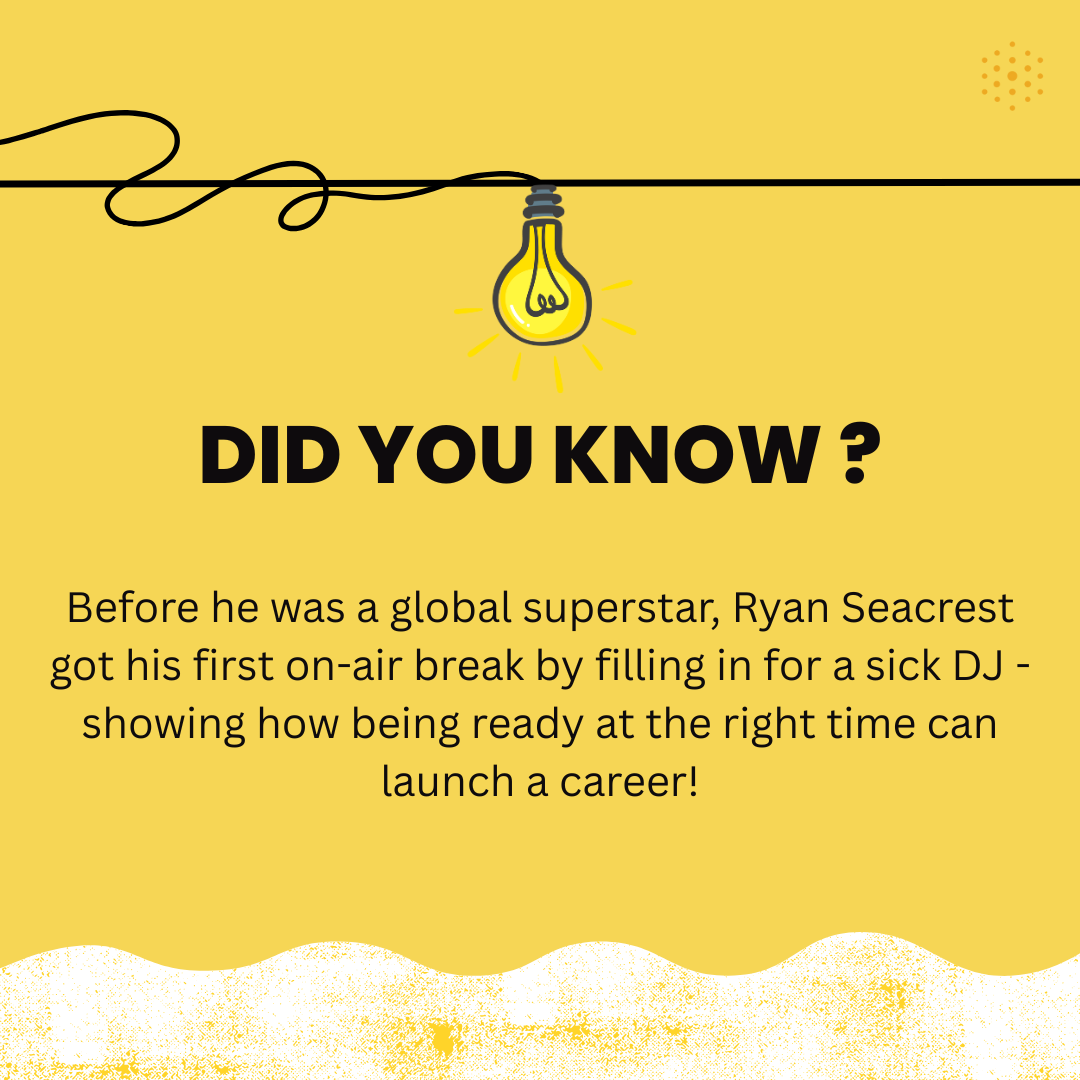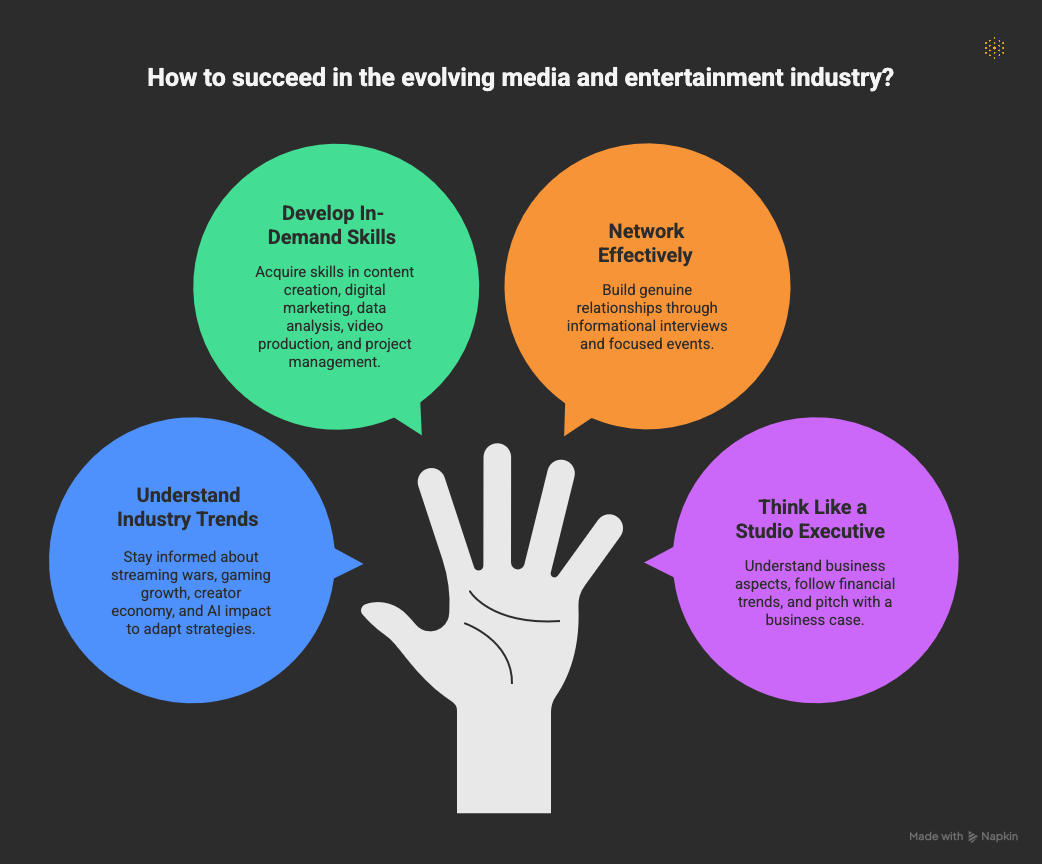How can you build a successful career in media and entertainment in 2025?
Stay ahead by understanding new industry dynamics like streaming, gaming, and the creator economy. Develop hybrid skills across storytelling, data, and digital marketing, network strategically, and learn the business side of entertainment to turn your creative passion into a sustainable, impactful career.
Breaking into media and entertainment today means playing on a very different field than the one ruled by cable bundles and Friday box office tallies.
Audiences start on digital first, and platforms decide what gets seen.
In May 2025, streaming captured 44.8% of total U.S. TV usage, overtaking the combined share of broadcast and cable (44.2%) for the first time, according to Nielsen’s The Gauge.
As streaming overtakes broadcast and cable, success in media and entertainment now requires more than just passion.
This guide breaks down the trends, skills, and strategies that will help you move from aspiring professional to indispensable player in media and entertainment.
1. Understand the Industry's New Playground
The media and entertainment industry is no longer just about traditional film, TV, and music.
The digital revolution has completely reshaped the landscape, with new platforms and technologies emerging at a breakneck pace.
To succeed, you need to understand these new trends and how they're impacting the industry.
Here are some of the key trends to watch:
- The Streaming Wars are Heating Up: Over-the-top (OTT) streaming services like Netflix, Disney+, and Amazon Prime Video are dominating the market. In fact, OTT video revenue is projected to grow from $291.3 billion in 2024 to $318.5 billion in 2029, according to PwC. This means there's a huge demand for content creators, producers, and marketers who understand the streaming landscape.
- Gaming is the New Frontier: The gaming industry is booming, with global audiences surpassing 300 million for eSports alone. According to Deloitte, 78% of millennials, 60% of Gen X are regularly playing video games. This has created a wealth of opportunities for game developers, designers, and marketers.
- The Creator Economy is Exploding: User-generated content (UGC) on platforms like TikTok, YouTube, and Instagram is reshaping how we consume media. According to Goldman Sachs Research, the 50 million global creators today are expected to increase at a compound annual growth rate of 10-20% in the coming five years. This has opened up new career paths for social media managers, content strategists, and influencer marketers.
- AI is a Game-Changer: Generative AI is revolutionizing content creation, from writing scripts to generating entire gaming worlds. While still in its early stages, modern generative AI tools simplify creative tasks, enhance workflows, and open new opportunities for creators and businesses.

2. Develop In-Demand Skills
The media and entertainment industry is looking for a diverse range of skills, from creative talents to technical expertise.
Here are some of the most in-demand skills right now:
- Content Creation: Whether you're a writer, a video editor, or a graphic designer, the ability to create compelling content is essential.
- Digital Marketing: With the rise of social media and streaming platforms, digital marketing skills are more important than ever. This includes everything from SEO and social media marketing to data analysis and content strategy.
- Data Analysis: Companies are increasingly relying on data to make informed decisions. The ability to collect, interpret, and share data is a valuable skill in any role.
- Video Production: From pre-production to post-production, video production skills are in high demand across the industry.
- Project Management: The ability to manage projects, budgets, and timelines is crucial for any aspiring producer or manager.
3. Network with a Purpose, Not Just a Pulse
In an industry where many jobs are filled through personal recommendations before ever being posted online, how you network makes all the difference.
The goal isn't just to collect contacts; it's to build genuine, mutually beneficial relationships.
- Master the Informational Interview: This is your golden ticket. Identify people who have the job you want in 5 years. Reach out with a specific, concise, and respectful email. Don't say "Can I pick your brain?" Instead, say "I've been following your work on [Project Name] and was so impressed by [Specific Detail]. As someone passionate about [Your Field], I'd be grateful for 15 minutes of your time to learn about your career path." Be prepared with thoughtful questions about their journey and challenges, not just asking for a job.
- Go Beyond the Big Events: Major conferences are great, but often overwhelming. Look for smaller, more focused events: panel discussions at local universities, screenings of independent films, or workshops hosted by professional organizations like the Directors Guild of America or the Producers Guild of America. The connections you make in these intimate settings are often more meaningful.
- Provide Value First: Instead of asking for a favor, offer one. If you meet a screenwriter, mention a book or article you read that reminded you of their work. If you connect with a producer online, share a link to a new technology they might find interesting. This shifts the dynamic from you being a job-seeker to you being a knowledgeable and helpful peer.
- Use LinkedIn as a Research Tool, Not Just a Rolodex: Don't just send blind connection requests. After you meet someone, send a personalized request mentioning where you met and what you discussed. Use LinkedIn to see who works at your dream companies and what their career paths look like. This helps you identify who to reach out to for those valuable informational interviews.

4. Think Like a Studio Executive, Not Just a Creator
Passion for your craft is essential, but understanding the business side of the industry will set you apart from the competition.
Creatives who can speak the language of business are infinitely more valuable.
- Understand the "Why": Why do some shows get greenlit while others don't? It's not just about quality; it's about business. Learn about target demographics, market trends, and monetization models. Understand the difference between a subscription-based model like Netflix and an ad-supported model like Peacock. This knowledge will help you create and pitch projects that align with a company's business goals.
- Follow the Money: Read industry trades like Variety, The Hollywood Reporter, and Deadline daily. Pay attention to box office numbers, streaming ratings, company earnings reports, and major deals. Who is getting funding? What types of projects are getting acquired? Understanding the financial health and strategic direction of different companies will help you target your job search and tailor your pitches.
- Pitch with a Business Case: Whether you're a writer, director, or designer, you're always pitching - your script, your vision, your skills. Frame your pitch with the business in mind. Don't just say "This is a great story." Say "This story will appeal to the 18-34 female demographic, a key growth area for your platform, and has strong potential for a multi-season arc."
- Embrace the Data: Studios and streaming services use data to make decisions about everything from casting to marketing. While you don't need to be a data scientist, having a basic understanding of how data is used to analyze audience behavior and predict trends is a huge advantage.
Final Thoughts
Media and entertainment is evolving faster than ever, streaming is now the default, gaming has become a global arena, and the creator economy keeps expanding.
To rise above the competition, pair your passion with market awareness, relevant skills, and a polished, confident pitch.
That’s where having the right career support makes a difference. Hiration helps aspiring professionals polish resumes, prepare for interviews, and optimize LinkedIn profiles so you can position yourself confidently for roles in this fast-moving industry.
With the right preparation, you won’t just keep up with change, you’ll be ready to lead it.
Media & Entertainment Careers — FAQ
Is media and entertainment still a stable career choice?
Yes. The industry is growing, not shrinking — streaming alone captured 44.8% of total U.S. TV usage in 2025, surpassing cable and broadcast. New opportunities are emerging across content, gaming, and digital production.
What are the biggest trends shaping media careers today?
Streaming dominance, gaming expansion, AI-driven content creation, and the booming creator economy are redefining roles. Professionals who understand these trends can find opportunities in production, strategy, and tech-led storytelling.
Which skills are most valuable in the media industry now?
Top skills include content creation, video editing, digital marketing, project management, and data analysis. Combining creativity with technical and analytical expertise makes you highly employable in this fast-changing field.
How can I get noticed without major connections?
Start by building authentic relationships. Attend smaller events, join niche online communities, and request short informational interviews with professionals you admire. Offer value in conversations — insights, feedback, or collaboration ideas.
What’s the best way to network effectively?
Be intentional. Reach out with specific questions, reference shared interests or projects, and follow up meaningfully. Avoid generic “Can I pick your brain?” messages — personalize every interaction to build genuine, long-term rapport.
Do I need a creative background to work in entertainment?
Not necessarily. The industry also values analytical, technical, and business-oriented professionals. Roles in operations, marketing, audience insights, and strategy are essential for running modern media organizations efficiently.
How is AI affecting jobs in media?
AI is reshaping how content is written, edited, and marketed. It automates repetitive work, speeds up production, and opens new opportunities for roles focused on AI-assisted creativity and ethical technology use in storytelling.
How can I pitch creative ideas successfully?
Think like a studio executive. Back every idea with a clear business case — identify target demographics, competitive differentiation, and monetization potential. Show how your project fits market demand, not just creative appeal.



